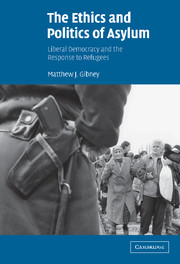Book contents
- Frontmatter
- Contents
- Acknowledgements
- Introduction
- 1 Partiality: community, citizenship and the defence of closure
- 2 Impartiality: freedom, equality and open borders
- 3 The Federal Republic of Germany: the rise and fall of a right to asylum
- 4 The United Kingdom: the value of asylum
- 5 The United States: the making and breaking of a refugee consensus
- 6 Australia: restricting asylum, resettling refugees
- 7 From ideal to non-ideal theory: reckoning with the state, politics and consequences
- 8 Liberal democratic states and ethically defensible asylum practices
- List of references
- Index
1 - Partiality: community, citizenship and the defence of closure
Published online by Cambridge University Press: 22 September 2009
- Frontmatter
- Contents
- Acknowledgements
- Introduction
- 1 Partiality: community, citizenship and the defence of closure
- 2 Impartiality: freedom, equality and open borders
- 3 The Federal Republic of Germany: the rise and fall of a right to asylum
- 4 The United Kingdom: the value of asylum
- 5 The United States: the making and breaking of a refugee consensus
- 6 Australia: restricting asylum, resettling refugees
- 7 From ideal to non-ideal theory: reckoning with the state, politics and consequences
- 8 Liberal democratic states and ethically defensible asylum practices
- List of references
- Index
Summary
Do we want people to be virtuous? Let us then start by making them love their fatherland. But how are they to love it if the fatherland is nothing more for them than for foreigners, and accords to them only what it cannot refuse to anyone?
Jean-Jacques Rousseau 1755The right to choose an admissions policy … is not merely a matter of acting in the world, exercising sovereignty, and pursuing national interests. At stake is the shape of the community that acts in the world, exercises sovereignty, and so on. Admission and exclusion are at the core of communal independence. They suggest the deepest meaning of self-determination.
Michael Walzer 1983How would liberal democratic states respond to refugees if their actions were motivated solely by moral considerations? Would these states be justified in restricting the entrance of refugees, or, for that matter, other needy entrants, in order to protect the social, political and economic interests of their citizens? On what criteria would a morally defensible admissions policy for states rest? At least two sharply opposed responses to these questions can be gleaned from the major strands of contemporary political theory. One view, partialism, works with an ideal of states as distinct cultural communities possessing a right to self-determinination which justifies priority for the interests of citizens over those of refugees in entrance decisions.
- Type
- Chapter
- Information
- The Ethics and Politics of AsylumLiberal Democracy and the Response to Refugees, pp. 23 - 58Publisher: Cambridge University PressPrint publication year: 2004



